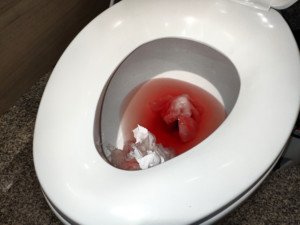Hematuria Blood in the Urine , can be either gross (visible) or microscopic (only visible through a microscope). Gross hematuria can vary widely in appearance, from light pink to deep red with clots. Although the amount of blood in the urine may be different, the types of conditions that can cause the problem are the same, and require the same kind of treatment.
Thank you for reading this post, don't forget to subscribe!Patients who have microscopic hematuria will be unaware of a problem and their condition will most commonly be detected when other complaints starts along with hematuria.
Causes of Hematuria or blood in the urine
The causes of gross and microscopic hematuria are similar and may result from bleeding anywhere along the urinary tract.
One cannot readily distinguish between blood originating in the kidneys, ureters (the tubes that transport urine from the kidneys to the bladder), bladder, or urethra. Any degree of blood in the urine should be fully evaluated by a physician.
Kidney and bladder stones can cause irritation and abrasion of the urinary tract, Trauma affecting any of the components of the urinary tract, prostate, hematologic disorders involving the body’s clotting system, , cancer any where along the urinary tract.
Many allopathic drugs increase the risk of bleeding, such as aspirin, warfarin , or clopidogrel etc.
Diagnose the causes of blood in the urine
The evaluation for blood in urine consists of taking a history, performing a physical examination, evaluating the urine with a chemical test strip and under a microscope, and obtaining a culture of the urine to identify any bacteria present.
Lower urinary tract symptoms, such as urgency (feeling a strong need to urinate) and frequency (urinate frequently), burning or pain when urinating, the presence of fever or chills, are suggestive of infection. Recent trauma, even if believed by the patient to have been inconsequential, should be considered as a potential cause.
Abdominal or flank pain, especially if radiating to the inguinal or the genital area, may suggest ureteral or kidney stones.
The physical exam will focus on possible sources of hematuria. Bruising over the back or abdomen may indicate trauma. A repeat urinalysis, as well as a urine culture, should be obtained. The presence of white blood cells on urinalysis is more consistent with a urinary tract infection. Protein, glucose, or sediment in the urine may indicate the presence of a disease of the kidneys.
Along with blood test to check kidney function and a blood-pressure check should be done.
In addition to the basic history and physical and urine examination, there are three additional components for diagnosis of hematuria: imaging, urine cytology, and cystoscopy.
The CT scan is an imaging evaluation of the urinary tract.
Intravenous pyelogram (IVP) (a type of X-ray evaluation of the urinary tract).
The CT scan is more commonly performed than the IVP to evaluate the urinary tract and should be considered the test of choice.
Both of these studies are especially useful for evaluating the kidneys and ureters, but not the bladder, prostate, or urethra. For that purpose, a cystoscopy is necessary.
Cystoscopy (a thin, flexible cystoscope or fiberoptic camera), is inserted via the urethra into the bladder to directly visualize any lesions or sources of bleeding.
This is usually done with local anesthetic jelly injected into the urethra.
Finally, urine cytology involves giving a urine sample to be analyzed by a pathologist for the presence of cancerous or abnormal-appearing cells.
Note : Men over 50 should discuss with their doctor an annual prostate-specific antigen (PSA) blood test which is used to screen for prostate cancer, which begins at age 45 and in all races, a history of prostate cancer in close family members may indicate an earlier start of screening.
Allopathic treatments for blood in the urine
Allopathic treatments for hematuria vary widely and depend on the reason for the bleeding. It is important to note that quite often no cause is found for the hematuria. This should not be a source of major concern, however, since an appropriate workup effectively rules out the most serious causes of hematuria (for example, cancer).
In cases where a workup is negative and the cause of the hematuria remains unknown, observation with repeat urinalysis is a reasonable option. A blood test to check kidney function and a blood-pressure check should be done as well. Caucasian men over 50 should discuss with their doctor an annual prostate-specific antigen (PSA) blood test which is used to screen for prostate cancer.
Further discussion of the treatment for hematuria would depend upon the results of the workup and the exact cause of the hematuria.
Homeopathic treatments of Hematuria or blood in the urine
Treatments for hematuria vary widely and depend on the reason for the bleeding. Some of the best homeopathic medicine for hematuria or blood in urine are :
Berberis Vulgaris :
Berberis Vulgaris is a very well known medicine for blood in urine and for renal complaints. It is the most frequently prescribed medicine for kidney stones and hematuria. A jelly-like sediments or thick bloody mucus in the urine, sharp pain in the kidney that extends down through the ureter into the bladder and urethra.
Lycopodium :
Lycopodium – hematuria with renal calculus. Urination relives the pain for a while. The urine contains red sand, urine scanty, Micturition (passes with a burning sensation), Nocturnal urination (need to urinate frequently at night).
Cantharis:
Hematuria accompanied by a burning sensation during urination, Cutting burning in the urethra, bloody urine.  The burning is present before, during and even after passing urine. Urine passed drop by drop with blood, and there is a constant desire to pass urine. Strangury and bladder tenesmus. Intolerable urging and tenesmus. Nephritis with bloody urine. Violent paroxysms of cutting and burning in whole renal region, with painful urging to urinate; bloody urine, by drops. Intolerable tenesmus; cutting before, during, and after urine. Membranous scales looking like bran in water. Urine jelly-like, shreddy.
The burning is present before, during and even after passing urine. Urine passed drop by drop with blood, and there is a constant desire to pass urine. Strangury and bladder tenesmus. Intolerable urging and tenesmus. Nephritis with bloody urine. Violent paroxysms of cutting and burning in whole renal region, with painful urging to urinate; bloody urine, by drops. Intolerable tenesmus; cutting before, during, and after urine. Membranous scales looking like bran in water. Urine jelly-like, shreddy.
Aconit Nepalus
Suppression of urine, with pressure in the bladder and pains in the loins. A frequent desire to urinate, accompanied by anxiety and pain. Flow of urine, with sweat, diarrhoea, and colic. Involuntary emission of urine, relaxation of the neck of the bladder. Enuresis, with thirst. Urine scanty, burning, deep red, and with a sediment of a brick colour. Bloody sediment. Scanty, red, hot urine, without sediment. Heat and tenesmus in the neck of the bladder.
Apis Mellifica
Apis Mellifica – For blood in urine with burning and stinging pain in the urethra. Burning is most prominent when passing the last drops of urine. Urine scanty, scalding, inability to retain urine even for a moment when the urge appears.
Nitric Acid
Nitric Acid – a powerful medicine for bloody urine when the urine is offensive in nature (strong and highly offensive). Albuminuria. Urine – dark, bloody, scanty and foul. Urine may feel cold while passing. Some patients, chilliness in the spine appears along with bloody dirty urine.
Sarsaparilla
Urine scanty, slimy, flaky, sandy, bloody. Gravel. Renal colic. Severe pain at conclusion of urination. Urine dribbles while sitting. Bladder distended and tender. Child screams before and while passing urine. Sand on diaper. Renal colic and dysuria in infants. Pain from right kidney downward. Tenesmus of bladder; urine passes in thin, feeble stream. Pain at meatus.
Uva Ursi
Uva Ursi is the best when the urine contains blood cells along with large quantity of sticky mucus. Pain in the bladder and urethra while passing urine. Pains are tearing and spasmodic. frequent urge to pass urine. Uva Ursi works well when kidney stone pain accompanies mucus and blood in urine.
Erigeron Canadense
Haemorrhages are caused and cured by this remedy. Persistent haemorrhage from the bladder. Haemorrhage from the uterus, with painful micturition. Profuse bright-red blood. Pain in left ovary and hip. Chronic gonorrhoea, with burning micturition; continual dribbling. Dysentery, with soreness and burning in bladder. Tympanites.
Phosphorus
Haematuria, especially in acute Bright’s disease. Turbid, brown, with red sediment.
Terebinthina
Terebinthina is an effective treatment for blood in urine where the urine has coffee ground sediments. The urine appears dark or black, mixed with blood. Inflamed kidneys that follow an acute disease. Burning, cutting pain in the urethra with strangury and tenesmus. When albuminuria accompanies hematuria.
For consultation; Feel free to whatsapp us or visit our clinic.
P. S : This article is only for doctors having good knowledge about Homeopathy and allopathy, for learning purpose(s).
For proper consultation and treatment, please visit our clinic.
Location, address and contact numbers are given below.
NoN of above mentioned medicine(s) is/are the full/complete treatment, but just hints for treatment; every patient has his/her own constitutional medicine.
To order medicine by courier, please send your details at WhatsApp– +923119884588
 Dr. Sayyad Qaisar Ahmed (MD {Ukraine}, DHMS), Abdominal Surgeries, Oncological surgeries, Gastroenterologist, Specialist Homeopathic Medicines.
Dr. Sayyad Qaisar Ahmed (MD {Ukraine}, DHMS), Abdominal Surgeries, Oncological surgeries, Gastroenterologist, Specialist Homeopathic Medicines.
Senior research officer at Dnepropetrovsk state medical academy Ukraine.
Location: Al-Haytham clinic, Umer Farooq Chowk Risalpur Sadder (0923631023, 03119884588), K.P.K, Pakistan.
Find more about Dr Sayed Qaisar Ahmed at :
https://www.youtube.com/Dr Qaisar Ahmed
https://www.facebook.com/dr.qaisar.dixecosmetics

Comments are closed.